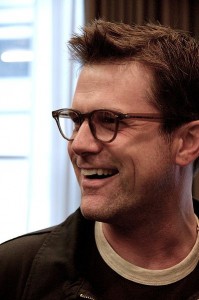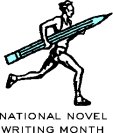 The article “Litterære manifester for et nyt årti” in the Danish newspaper Informationen gives 9 manifestos of contemporary Danish writers containing their thoughts about literature in the new decennia that we just entered. As always the thoughts are personal and thereby very different from each other. Some don’t believe in manifestos while others write a nice little article with their thoughts. One subject that is more often mentioned is the difference between the popular detective stories and the less commercial literary works. Most hope that the latter will survive the stream of very well marketed, and occasionally well written detective stories. This cry for support for the original, more personal literary works make it clear that the writers see a clear difference in value between the two kind of books. The literary works might not make the writer a lot of money (and maybe if they do than only after the writer’s death) but they do contribute to the more interesting and valuable part of literature. (Thanks to Ian)
The article “Litterære manifester for et nyt årti” in the Danish newspaper Informationen gives 9 manifestos of contemporary Danish writers containing their thoughts about literature in the new decennia that we just entered. As always the thoughts are personal and thereby very different from each other. Some don’t believe in manifestos while others write a nice little article with their thoughts. One subject that is more often mentioned is the difference between the popular detective stories and the less commercial literary works. Most hope that the latter will survive the stream of very well marketed, and occasionally well written detective stories. This cry for support for the original, more personal literary works make it clear that the writers see a clear difference in value between the two kind of books. The literary works might not make the writer a lot of money (and maybe if they do than only after the writer’s death) but they do contribute to the more interesting and valuable part of literature. (Thanks to Ian)
Kategori: Posts with Links
-
Informationens 9 manifestos
-
Merlin Mann: Figure out who you are
 This post from 43folders.com contains a video with another interesting line of thoughts by Merlin Mann, who thinks about productivity, creativity and the caveats surrounding them.
This post from 43folders.com contains a video with another interesting line of thoughts by Merlin Mann, who thinks about productivity, creativity and the caveats surrounding them.Merlin presents his ideas in a popular way, fast and often funny, but he is serious and dedicated in trying to find out the truth about his subjects.
It is another attempt to define, and thereby better deal with, procrastination.
Here are some quotes I wrote down:
Procrastination happens when we don’t know what to do.
(You go look around to find out what you should do next.)
Sometimes you procrastinate because you feel you need to do something else for a while. But if so, then never forget who you are and what you want.
It’s important for creativity to read or do something even if you don’t know why you are doing it.
But sometimes you have to put your head down and work really hard.Happiness is in the right balance of these two.
In his video Merlin explains that it is important to figure out who you are and to always keep that in mind. Procrastination can be o.k., but it should never lead you away from your own goal.
There are truly many more thoughts in the video including his well meant advice on how to protect yourself from certain forms of procrastination.
—–
Here’s another post I wrote about Merlin Mann’s ideas.
-

Hail the caesar of your genius
After reading a post by Merlin Mann on the process of starting a project (and to keep going) and after listening to Elizabeth Gilbert in a TED-talk mentioned in the post about nursing your creativity, I understand that they offer a way to deal with one of the major obstacles for writers..
We all know it basically comes down to the old truth of “ You just have to work for it and all will be well”, but it is not so easy in practice for the majority of us..
Both clearly indicate that writing on a daily basis is the key to getting work done and creating possibilities to get inspired during the process. As Merlin puts it in a Tweet:
.“Creative work, summarized: In the time you set aside each day to work your ass off, ignore anything that makes you consider stopping.”
.To be able to do this for a longer period – what about a lifespan? – is undoubtable the key to success. As Merlin stresses, this “anything that makes you consider stopping” is no sinecure.
.The majority of those threats that endanger continuation are based upon fear, and this means fear in all its facets. That is easy to say as fear rules just about anything in our world, but when it comes to for example writing it is all the more clearly. Writing is listening to the voice within, digging for inspiration in the depths of a human being, listening to all the tails from the incredible feedreader in the unmeasurable caves of our head. And what voices will be more loud and clear than the ones that originate of fear?
.To ignore those voices and to keep digging for the gold is a major achievement, reminding me of many classical stories, like for example Frodo in “The Lord of the Rings”. Being a writer, an active and serious one, is going through a lot of darkness, traveling on a seemingly hopeless journey like Frodo did.
.But it is also a quest, something that has to be done, for not doing it equals giving up and letting life age you without truly saving your soul.
.
Genius
.In her speech on Tedtalk.com Elizabeth Gilbert tells about her way of dealing with the voices of fear. She admits that they are a serious threat to her existence as a well-functioning human and comes up with a solution. Although being aware that it is not the only and most dependable system possible she states that it does her good and advocates to people to try it out for themselves. The idea originates from ancient Greek and Roman times, and it is not only for that not a revolutionary new idea, but Elizabeth gives a positive approach to it that can be a great relief to many.
.Her “trick” is to put the source of inspiration outside the person and thereby putting the blame for many of the problems the voices in head come up with outside herself. It is in that way not her responsibility to produce another flawless bestseller or her fault when the day’s writing isn’t flowing at all, but it is the inspirational voice from outside her that lets her down. Following old Roman traditions she calls this voice a genius.
But unlike romantic ideas of writers, or any other creative persons, being struck by a sudden moment of inspiration, like an arrow of cupid’s bow, she definately holds on to the idea that all she has to do to let her genius work for her is to show up and work every day. That is the only way to blame her genius and not her, because she was there, writing at her desk, giving the genius a fair chance to work.
.

-
Potgieters
I noticed a pattern in a whirl of thoughts and finds the last days. I had just finished a story from an old book that I took from the shelves a couple of days ago. The book from 1886 is the 7th edition of the Prose of E.J. Potgieter (1808 -1875). I read the story ” ‘t Is maar een penelikker” in which he writes down his vision upon the people working in the offices and desks, copying letters, bookkeeping and doing all those tasks connected to the extensive paperwork that accompanies trade. His words paint a black and rather hopeless world of dependency, low wages and no social security. A gray mass of people who just try to survive. He ends with saying that it is good that the government now (1840) thinks about pensions for their employees but also that the Dutch should take an example of how things were in the golden age of the Dutch, the 17th century. There people dared to explore, they went out and discovered the world, (“without needing so much paperwork as nowadays”). So he concludes by saying that we should sent our young and ambitious people abroad to let them learn, exploit, start companies and bring honor and glory to themselves and their country.
I searched for his name on the internet and read a biography of E.J. Potgieter, an important name in Dutch literature because he was one of the founders and major contributor of “De Gids”, the leading, if not only, Dutch magazine about literature for decennia. The article was negative about his efforts to get some 17th century spirit into the people he wrote for, it said it never worked and it couldn’t work because he wrote too complicated, too intellectual, even using words that did not fit into the time he lived, or in a form that was too hard to appreciate. It was said that he created his own world and that in the end no one got permission to enter it, nothing was good enough.
The story was written in 1840, the same year where (thanks google) a man named Andries Henrik Potgieter became the leader of a colony in South Africa that he apparently named “Potchefstroom” after himself. I know virtually nothing about South-African history, but I do know it wasn’t a peaceful an uncomplicated one, and being a “voortrekker-leader” like Andries Henrik was probably not something to be favored either. So while one influential Potgieter wrote about creating opportunities abroad another Potgieter was doing so in practice, for whatever reason and with whatever consequences.
The writer Potgieter liked an intellectual use of language, even referring to 17th century Dutch, the South-African Potgieter spoke Afrikaans, a language that is spoken today by app. 6,5 mill. people in the south of the African continent and that is based upon Dutch dialects with influences that reach back to the 17th century.
So the story of one Potgieter seems to compliment the story of the other.The search revealed a lot of Potgieters in South-Afrika and following one link I found and listened to videos of the South-African Band Glaskas. Great, and for me as a Dutchman it is very special to hear Afrikaans. I can thank the writer E.J. Potgieter for it, because his short story made me curious enough to search for his name.
This is my favourite:
Glaskas: Stormstille
-
Yes!?
I can’t help thinking about what it is I learn from a short internet article like this: McGill Tribune – MINDFUNK: Journal writing for health
It might be worth noticing as stated that just writing about how bad or good you feel doesn’t help much in solving issues in your life and that making a true effort to write your thoughts down can be beneficial. But “The process of writing about traumatic events or important events can have beneficial physical and mental health effects” makes me wiggle a little on my chair. Yes, the process of writing most certainly will make you go through feelings and memories so it must be true. But it is the acceptance and understanding, the dealing with a problem that is truly beneficial. Not the writing itself.
Besides, writing about a trauma on a moment in your life where you can’t handle it might not be such a good idea. So, naturally, before you have the wish to write things down there probably already started a healthy process of dealing with it, conscious or not.What about talking, singing, fiction-writing, dancing, performing, drawing, meditating or what ever one can do to get into contact with anything beneath the superficial smile to the neighbor?
But ok. I blog about writing and I am sure writing a journal can have a good effect.
Shall we dance now?
(Via Time to Write)
-
My NaNoWriMo 08
 NaNoWriMo ’08 was a mixed pleasure for me. I had chosen a not complicated storyline with many autobiographical elements and after plotting it all into yWriter I felt pretty comfortable. In the beginning the writing progressed well but I quickly noticed that this writing 1667 words a day – no matter what quality – was something different than I am used to. It was fun to notice that writing 50.000 words in a month is possible and the thrill of seeing a book evolve was very nice and fulfilling. Plotting is something I had not really done before but it seemed to work well.
NaNoWriMo ’08 was a mixed pleasure for me. I had chosen a not complicated storyline with many autobiographical elements and after plotting it all into yWriter I felt pretty comfortable. In the beginning the writing progressed well but I quickly noticed that this writing 1667 words a day – no matter what quality – was something different than I am used to. It was fun to notice that writing 50.000 words in a month is possible and the thrill of seeing a book evolve was very nice and fulfilling. Plotting is something I had not really done before but it seemed to work well.I got quickly bored however by just filling out the chapters and the thoughtless typing down what I remembered and wanted to say and soon after I got convinced that the quality of the writing itself was horrible. It felt like forcing.
It made that I wasn’t very interested in the what I was doing and halfway through the month I even started looking for distraction that would prevent me from writing (thanks Ubuntu!).The whole exercise has given me the idea that a lot is possible and what I wrote is of personal importance for me, or rather the fact that I wrote it. I don’t think that I will join again next year. It seemed to me to be a waist of time to produce something so forcefully and to know that 90% of it is garbage because of it.
I left my carefully build writing habits and I will need to make an effort to get back into it and to reset my mind and intensity in writing.